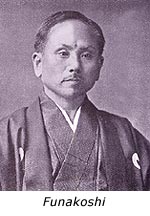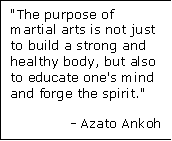 Azato
Ankoh: Azato
Ankoh:
A Short Story About
My Teacher
Part 2: The Two-Story Shoulders of Kanna, Azato's Political
Force & The
Lesson in Azato Village
By Gichen Funakoshi
Translated & Edited by
Patrick & Yuriko McCarthy
Editor's Note: This article is the second of two excerpts from a new
book, "Karatedo Tanpenshu," a collection and new English translation
of early writings of Funakoshi, historical photos and other materials
compiled and translated by Patrick and Yuriko McCarthy. The orignal Funakoshi
articles were written in 1934 for the Keio Gijuku Taiiku-kia Karate Bu
Kaiho.
The Two-Story Shoulders of Kanna
A close friend of mine, named Shoko, told me the story of Kanna Yoshin.
The story of Yoshin is quite familiar among the educated in the Chinese
or Japanese classics. Illustrating the importance of combining physical
training with scholarly pursuit in order to master martial arts, "Bun
Bu Ryo Do" is an old proverb understood by all martial artists and
aptly described the kind of person Kanna Yoshin was.
His dedication to training and study was unprecedented, and he was build
like a house. His arms, shoulders and neck muscles were virtually the
size of a two-story building. Hence, he acquired the nickname "two
story-shoulders Kanna."
Like Azato, so too did Kanna love swordsmanship. However, in spite of
his physical prowess he could never defeat Azato Sensei, though having
tried on several occasions. Kanna was extremely disappointed with himself,
as he could never seem to get the better of Azato, in spite of stepping
up his training. Actually, it was never Kanna's physical skill which prevented
him from overcoming Azato, but rather his mind set and my teacher's unique
ability to read an attack and destroy it in progress.
I remember Sensei speaking to me about such issues and importance he
placed upon strategy if one was to overcome any adversary. "From
a martial arts point-of-view, one must study three separate issues to
develop a kind of clairvoyance about judging a person's character,"
Sensei told me.
The first is "Man" (Japanese pronunciation) meaning to fulfill.
The second is "Soon," meaning a short measure of distance. The
third is "Etsu," meaning to surmount, or go beyond, like in
the first example of "Man," Kanna was a typical over-achiever
and his over-confident character reflected such. "Therefore,"
Sensei said, "If one is able to correctly evaluate the condition
of one's opponent, then it merely becomes an issue of addressing his weakness."
 In
the case of Kanna's ongoing attempts to defeat Azato, that is just exactly
what he did. Azato simply used "Soon" and "Etsu" to
overcome Kanna's "Man." In
the case of Kanna's ongoing attempts to defeat Azato, that is just exactly
what he did. Azato simply used "Soon" and "Etsu" to
overcome Kanna's "Man."
"Actually," Sensei told me, "it doesn't matter if it is
swordsmanship or karate, the principles of combative engagement remain
the same, regardless. For example, if I purposely make an opening in an
attempt to deceive my opponent, the chances are that he will try to attack
it. Expecting such a thing, I can exploit his movement and overcome his
weakness."
The Political Force of Azato
As I mentioned previously, my teacher was a typical scholar warrior of
Ryuku Kingdom and did much to contribute to the culture of Okinawa. In
addition to his martial arts prowess he was one of two well-known political
figures during his time. His counterpart was a man named Mr. Ishado Seiei.
Judging by his close relationship with various celebrities and Japan's
top politicians, including the Prime Minister himself, Azato was intelligent
and as skillful, and he was influential.
After Japan made the transition from feudalism into democracy, and Okinawa
officially became part of the Japanese empire, much of the confusion and
unrest over cultural assimilation was left in the hands of men like Azato
and Ishado.
With political strengths radically shifting in Okinawa after the Sino-Japanese
war of 1894/95, Azato's upward mobility strengthed both the foundation
and directions of his campaign. It was just about then that his Excellency,
the Sho Marquis sought out the advice and political assistance of men
like Azato and Ishado in seeking to strengthen the economy and morale
of Okinawan society.
Supporting the Marquis, the collective efforts of Azato and Ishado laid
a political foundation upon which the Kodokai (the precursor of Okinawa's
present day parliamentary government) was established.
During the Meiji Restoration, a time of great political change in Japan,
the Kodokai reformation supported mainland policy implicitly and sought
to facilitate its movement in Okinawa. Among the many social changes was
abolishing the Chongmage (topknots) hairstyles. In spite of some opposition,
it was largely because of the widespread support of the Kodokai that reformation
was successful.
During that time Okinawa's royal family had been relocated to Tokyo's
Kojimachi, near Yotsuya. However, it was because of his administrative
prowess that master Azato remained at the forefront of political power
in Okinawa until his retirement. Azato was really considered a local hero
by many.
The Lesson in Azato Village
An old saying maintains that people of lower rank like to copy the actions
of the upper ranks. During Azato's time there were a group of brave young
men in his village with little or no moral constitution. They often took
pleasure in showing off, and sometimes even picked on weak or helpless
passers-by at night. As such, Azato's village developed a terrible reputation
for unprovoked violence.
Learning of this situation, Azato Sensei decided to remedy the problem
and developed a plan. Changing his cloths to look like a commoner, he
strolled through the village late one night. Sure enough, not long after
he entered the village district, a person jumped out from the cover of
night and attacked him without warning or provocation. With no intention
to mortally injure the man, Sensei dropped him with a single blow to the
head.
The following morning Sensei petitioned the village chieftain to quickly
assemble everyone in the center of the village. Curiously, everyone gathered
to see what all the commotion was about. Everyone showed up except one
young man. Sensei asked why the young man was not present, and he was
told that he was sick. Assuming that the sick man was the culprit Sensei
sent his private palanquin (symbol of status and a conveyance: a covered
wooden couch mounted on poles which can be carried on the shoulders of
two or four men) to fetch him. Soon the young man with a fresh bandage
on his face arrived in the palanquin.
In front of all the villagers, Sensei asked him what was wrong? Unable
to lift up his head from pain, the man murmured, "I was drunk last
night and fell in the ditch." Outraged, Sensei screamed at the fellow,
"Don't lie to me boy, now tell me the truth or else." Finally,
the young man confessed to the assault on Azato and begged for forgiveness.
Sensei publicly told the villagers that, in an effort to rid the district
of their terrible reputation,, he had been out trolling for the gang and
been attacked by the man in question. "It was me," said Sensei
to the man. "I was the one who knocked you senseless last night."
After Azato's lesson in the village that day the district became safe
again to travel at night and ultimately regained its reputation as a safe
and quiet neighborhood.
In spite of the countless anecdotes surrounding Azato Sensei, I believe
that I have written enough for now. One thing, however, I would like to
say is that Master Azato had planned to write a training manual on martial
arts when he retired from public service. Unfortunately, he passed away
before starting the project. It is this writer's humble opinion the martial
arts world suffers greatly not having the work of Azato Ankoh.
Sensei used to say that, "The purpose of martial arts is not just
to build a strong and healthy body, but also to educate one's mind and
forge the spirit. Martial arts seeks to build the body, improve one's
character and find inner-harmony. It cannot guarantee it."
Among his favorite books were Sun Tsu's "Art of War," and "The
Six Strategies of War," Lao Tsu's "Tao Te Ching," San Lue,"
Wei Ryao Zi," Su Ma Fa," and Tang Ling Wen Dui." Master
Azato believed that the "Art of War" was the Bible for all martial
artists. Whenever I recall the fact that Sensei had not published his
knowledge, philosophy and application for future generations, I cannot
but feel empty.
To Order This Book:

This book is not available in bookstores, and must
be ordered from the publisher.i
To order this book, send your name, address (including
country and postal code), credit card (Visa/Master Card) and credit card
details (your name as it appears on the card, card type, number and expirations
date) to:
International Ryukyu Karate Research Society
PO Box 420
Brisbane 4014, Australia
The $39.95 includes airmail shipping.
Email Patrick
McCarthy at for more information or to make ordering arrangements.
Bank checks and money orders are not accepted for
international customers.
|